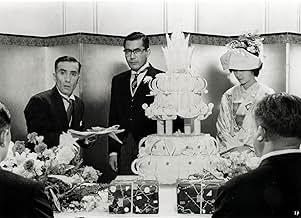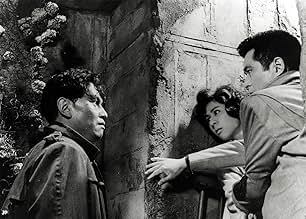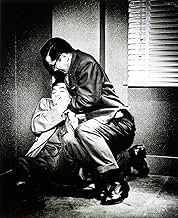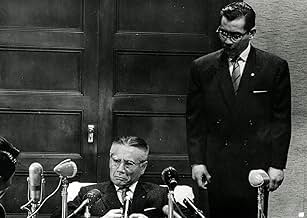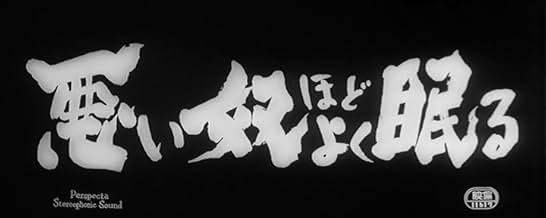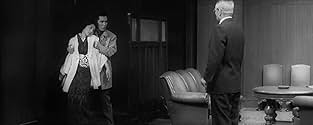ÉVALUATION IMDb
8,0/10
15 k
MA NOTE
Ajouter une intrigue dans votre langueA vengeful young man marries the daughter of a corrupt industrialist in order to seek justice for his father's suicide.A vengeful young man marries the daughter of a corrupt industrialist in order to seek justice for his father's suicide.A vengeful young man marries the daughter of a corrupt industrialist in order to seek justice for his father's suicide.
- Prix
- 3 victoires et 1 nomination au total
Avis en vedette
I just watched "The Bad Sleep Well," and finished reading the other viewers comments. So I will comment on both. "Seven Samurai" is perhaps my favorite film of all time, and I really like Kurasawa's work. Other than the brief plot summary, I didn't really know what to expect from "The Bad Sleep Well." The beginning can be somewhat confusing, as the reporters throw out lots of Japanese names and the viewer must struggle to understand what's going on and who is who. But as the film progressed, I found myself drawn in and completely absorbed by it. Don't worry if you don't get it at first, all will become clear. I found this to be an excellent film, and I would recommend it to any Kurasawa film. Sure, it's not action-packed like his samurai films. And yes, it is somewhat slow in pace. But I must say that I didn't really mind that. I found it quite engrossing. There are enough plot twists and turns to keep the viewer interested. I din't think that Toshiro Mifune did a bad job either, as some other viewers thought. He's not wild and crazy like in "Seven Samurai" or "Rashomon" but I didn't think he was badly cast. Sadly, I am not intimately familiar with "Hamlet," so I can't comment too much on the similarities. It seems to be the general opinion that this "The Bad Sleep Well" is loosely based on Hamlet, but I also agree that this won't detract from your enjoyment of the film in any way, and that knowing "Hamlet" doesn't mean that you will know what happens in this film. I agree with those who say that this is another underrated Kurarsawa masterpiece, and well worth seeing. Give it a chance!
"The Bad Sleep Well" is a forgotten gem from one of Japan's great masters, Akira Kurosawa. His other two Shakespeare adaptations, "Throne of Blood" (Macbeth) and "Ran" (King Lear), are much more famous and well-regarded, justifiably so if you have seen them ("Ran" is particular is my favorite of all Kurosawa films). However, this sharp and caustic adaptation of Hamlet deserves an equal amount of praise and recognition. It may be the most bleak subject matter that Kurosawa ever tackled - the corruption in the highest levels of government in post-war Japan.
The film begins with a long but funny wedding sequence that illustrates Kurosawa's great skill as a director. We (and the camera) are among a group of reporters discussing the numerous convenient reasons for the marriage; the bride is lame and the daughter of Iwabuchi, the head of corporation, and the bridegroom, Nishi, has aspirations to elevate his status in the business. We see the comedy of manners play out in this sequence in increasingly humorous situations as the various parties deny the rumors and reporters continue comment to each other, culminating in the panicked looks on the faces of the corporate higher-ups as the wedding cake arrives - in the shape of their office building, Public Corp., with a red X marking a spot in one of the windows where one of their former partners committed suicide. It's a virtuoso sequence that perfectly sets up the tone of the rest of the film.
The newspapers have a field day with this, especially when various members of Public Corp. are investigated for fraud and embezzlement, yet they stoically remain silent and the case goes nowhere. Then it heats up again as a few of them commit suicide; the rumors are that they were goaded into doing so (n fact, they were). However, without any substance to press the matter, the case is dropped. And that's when the real story begins - one of the Public Corp executives, Wada, survives and is rescued by Nishi and his shadowy accomplice, Itakura.
This is followed by a brilliant scene in which Wada is taken to his own funeral and observes the farce - all the while, Nishi plays him a tape with Moriyama and Shirai, his former partners, plotting his murder. The way Kurosawa stages this is masterful; the sublime music emanating from the funeral is contrasted dramatically with the cold-blooded words of Public Corp, as Wada listens on. One of the ways Wada contributes is to scare the living hell out of Shirai - Wada poses as a ghost of himself in order to freak him out (a clever method of adding in the ghost in Hamlet). As the plot progresses, Nishi reveals his reasons for saving Wada and exacting a very personal revenge on Iwabuchi and his cohorts; and the story's pace becomes more frantic and exciting with a dramatic but sudden conclusion.
Technically, Kurosawa is at his best here. The wedding and the funeral are both marvels of observational behavior and they contrast each other perfectly. He uses a lot of intriguing mise-en-scene compositions for his interiors that serve to highlight his characters' inner thoughts but very little movement of the camera in order to manipulate his audience; the dark nature of the story is enough to suck you in. One of the fascinating observations in "The Bad Sleep Well" is that nearly all of the characters are morally bankrupt and filled with secrets - even Nishi, the protagonist. His wife, the Ophelia character, is the only one that Kurosawa allows us to feel sympathy for, and even then in the end she is not fully spared her grief. Taken in this context, Kurosawa's Hamlet becomes a study in the morality and pragmatism of revenge but also an incisive jab at the fat cats in modern Japan.
If there is a flaw in the film, it is that the overall pacing is not always brisk enough to sustain the long running time (2 1/2 hours). The wedding, despite being absolutely essential, is protracted; the rest of the film is much quicker but still drags in parts. Also, Kurosawa seems unsure about his ending; the film ends quite abruptly but appropriately in terms of his larger point about the hopelessness of fighting the rampant corruption, I would argue. However, despite these flaws, overall "The Bad Sleep Well" is a masterful and dark excursion into the seedy side of corporate crime, using Shakespeare Hamlet brilliantly but not completely as it's core. Toshiro Mifune in particular gives one of his most unique low-key performances; instead of his usual fiery exterior we get a performance full of internalized anger throughout. Highly recommended.
The film begins with a long but funny wedding sequence that illustrates Kurosawa's great skill as a director. We (and the camera) are among a group of reporters discussing the numerous convenient reasons for the marriage; the bride is lame and the daughter of Iwabuchi, the head of corporation, and the bridegroom, Nishi, has aspirations to elevate his status in the business. We see the comedy of manners play out in this sequence in increasingly humorous situations as the various parties deny the rumors and reporters continue comment to each other, culminating in the panicked looks on the faces of the corporate higher-ups as the wedding cake arrives - in the shape of their office building, Public Corp., with a red X marking a spot in one of the windows where one of their former partners committed suicide. It's a virtuoso sequence that perfectly sets up the tone of the rest of the film.
The newspapers have a field day with this, especially when various members of Public Corp. are investigated for fraud and embezzlement, yet they stoically remain silent and the case goes nowhere. Then it heats up again as a few of them commit suicide; the rumors are that they were goaded into doing so (n fact, they were). However, without any substance to press the matter, the case is dropped. And that's when the real story begins - one of the Public Corp executives, Wada, survives and is rescued by Nishi and his shadowy accomplice, Itakura.
This is followed by a brilliant scene in which Wada is taken to his own funeral and observes the farce - all the while, Nishi plays him a tape with Moriyama and Shirai, his former partners, plotting his murder. The way Kurosawa stages this is masterful; the sublime music emanating from the funeral is contrasted dramatically with the cold-blooded words of Public Corp, as Wada listens on. One of the ways Wada contributes is to scare the living hell out of Shirai - Wada poses as a ghost of himself in order to freak him out (a clever method of adding in the ghost in Hamlet). As the plot progresses, Nishi reveals his reasons for saving Wada and exacting a very personal revenge on Iwabuchi and his cohorts; and the story's pace becomes more frantic and exciting with a dramatic but sudden conclusion.
Technically, Kurosawa is at his best here. The wedding and the funeral are both marvels of observational behavior and they contrast each other perfectly. He uses a lot of intriguing mise-en-scene compositions for his interiors that serve to highlight his characters' inner thoughts but very little movement of the camera in order to manipulate his audience; the dark nature of the story is enough to suck you in. One of the fascinating observations in "The Bad Sleep Well" is that nearly all of the characters are morally bankrupt and filled with secrets - even Nishi, the protagonist. His wife, the Ophelia character, is the only one that Kurosawa allows us to feel sympathy for, and even then in the end she is not fully spared her grief. Taken in this context, Kurosawa's Hamlet becomes a study in the morality and pragmatism of revenge but also an incisive jab at the fat cats in modern Japan.
If there is a flaw in the film, it is that the overall pacing is not always brisk enough to sustain the long running time (2 1/2 hours). The wedding, despite being absolutely essential, is protracted; the rest of the film is much quicker but still drags in parts. Also, Kurosawa seems unsure about his ending; the film ends quite abruptly but appropriately in terms of his larger point about the hopelessness of fighting the rampant corruption, I would argue. However, despite these flaws, overall "The Bad Sleep Well" is a masterful and dark excursion into the seedy side of corporate crime, using Shakespeare Hamlet brilliantly but not completely as it's core. Toshiro Mifune in particular gives one of his most unique low-key performances; instead of his usual fiery exterior we get a performance full of internalized anger throughout. Highly recommended.
"The Bad Sleep Well" is Akira Kurosawa's second handling of the film noir genre after "Stray Dog" in 1949 and three years before "High and Low" in 1963. These two films were gripping documentary-like police procedurals. In contrast, "The Bad Sleep Well", with its intriguing title and loosely Hamletian undertones, shows the way these procedurals can be made useless by the sheer power of bureaucratic Omerta... and I'm not using the word in vain.
The film is perhaps the most noirish of the three in its vitriolic depiction of corporate corruption, showing us the other side of modern Japan's coin where hierarchy governs not most but all of its institutions, family included. In fact, what the film accomplishes through the precise and uncompromising eye of Kurosawa's camera and a tight (if not somewhat tedious) script, reminds me of a classic among the classics: "The Godfather" and Coppola must have loved "The Bad Sleep Well".
The film is about a bunch of corporate executives in the Construction and Land Development business using their influence, wealth and occasionally disguised threats to hide a kickback scheme that occurred seven years ago. There's the Vice President Iwabushi, the Administrative Officer Moriyama, the Assistant-to-the-Chief Wada, the Contract Officer Shirai, each man representing a stratus protecting the upper layer from collapsing the higher you are, the safer you get, which plays exactly like the Mafia vertical organization with soldiers and "buffers" ... some execute and some are executed. The bad indeed sleep well.
"Ikiru", which is certainly Kurosawa's most acclaimed modern movie, hid behind its existential message an assertive comment against public bureaucracy. "The Bad Sleep Well" goes even further by subverting the clichés about Japanese's discipline with some employees going as far as sacrificing their lives. There's a moment where the accountant receives a message that says grossly "we'll take care of you, everything will be all right", and then he ultimately throws himself under a passing bus.
It's not often that you have two "Godfather" references in one, the message reminded me of the last talk between Tom Hagen and Frank Pentangeli in "Part II" and the sound of the truck coming with the close-up on the ma n's" face echoed the climax of the restaurant scene. And if the "Godfather" trilogy was about gangsters posing as respectable men, "The Bad Sleep Well" is about respectable men acting like gangsters. And I'm not done with the comparisons, the most notable one is the opening sequence with a wedding that makes the exposition elements flow without feeling too forced.
Snarky reporters are covering the wedding between the daughter of Iwabushi, played by Masayuki Mori (I couldn't believe it was 9 years after his youthful appearance in "The Idiot") and Nishi, a quiet and discreet secretary played by Toshiro Mifune. The girl has a lump and rumor has it that Nishi married her out of interests (they're half right actually). And so the wedding allows us to place names in face and a few incidents set up the action: an untimely arrest, Ibawushi's son Tatsuo (Tatsuya Mihashi) makes a speech where he threatens to kill Nishi if he ruins his sister's life but the icing of a cake is the wedding cake itself. In place of the real one, a cake representing the company's building is served, a rose placed in the seventh floor from which an employee jumped to his death, ending an investigation for corruption. "This marks the end of a one-act play," says a reporter "are you kidding?", retorts his colleague, "this is only a prologue".
And so the prologue ends and the action takes off through a series of incidents suggesting that there's a mole in the company who know about the events that occurred seven year ago, who ordered the cake to send a message and who's up to something. The film features one of the most elaborate schemes, a strategy of destruction whose many tactics include the disguise of Wada's disappearance into suicide. In a later scene, the man is allowed to assist his own funeral and hear his employees gloating at his death. Shirai is then gaslighted to the point that you almost feel sorry for him. Finally, Moyamari (Takashi Shimura) is forced to reveal where the dirty money by simply being starved. I had often wondered why no one thought of extorting money with a simple glass of water, glad a film thought of it.
Of course, it doesn't take long to reveal the perpetrator of all these actions, but more importantly his motive. It's obviously Nishi, the central protagonist, and it's easy to make the parallel with the seventh floor's death and his thirst for revenge but the best thing about the film is how conflicted Nishi is. He has obviously married the daughter to approach a man who is his enemy and with time, his sentiments grow. Moreover, even Wada starts to empathize with his actions and advise him against not becoming like the men he fight. The problem of Nishi is that his actions destroy the father of a person he cares for and ironically turns him into a character who, if not morally bad, uses the same tools than his enemies. It doesn't make him worse but his own morality is put in the film's equation.
Nishi's playful whistling is the film's musical leitmotif, suggesting that he's "enjoying" what he does to a limit. We do "enjoy" the way he toys with these serious men's sanity and sense of immunity and the film while two hours and half long, finds a way to draw us in Nishi's action. But the game stops near the third act, when his intentions are revealed, and the enemies fight back.
Now, I'm still puzzled by the ending, to the point I wondered whether it's the best or the worst thing about the film. One thing for sure, when it ended with that head being bowed and the title appeared, I was nodding mine.
The film is perhaps the most noirish of the three in its vitriolic depiction of corporate corruption, showing us the other side of modern Japan's coin where hierarchy governs not most but all of its institutions, family included. In fact, what the film accomplishes through the precise and uncompromising eye of Kurosawa's camera and a tight (if not somewhat tedious) script, reminds me of a classic among the classics: "The Godfather" and Coppola must have loved "The Bad Sleep Well".
The film is about a bunch of corporate executives in the Construction and Land Development business using their influence, wealth and occasionally disguised threats to hide a kickback scheme that occurred seven years ago. There's the Vice President Iwabushi, the Administrative Officer Moriyama, the Assistant-to-the-Chief Wada, the Contract Officer Shirai, each man representing a stratus protecting the upper layer from collapsing the higher you are, the safer you get, which plays exactly like the Mafia vertical organization with soldiers and "buffers" ... some execute and some are executed. The bad indeed sleep well.
"Ikiru", which is certainly Kurosawa's most acclaimed modern movie, hid behind its existential message an assertive comment against public bureaucracy. "The Bad Sleep Well" goes even further by subverting the clichés about Japanese's discipline with some employees going as far as sacrificing their lives. There's a moment where the accountant receives a message that says grossly "we'll take care of you, everything will be all right", and then he ultimately throws himself under a passing bus.
It's not often that you have two "Godfather" references in one, the message reminded me of the last talk between Tom Hagen and Frank Pentangeli in "Part II" and the sound of the truck coming with the close-up on the ma n's" face echoed the climax of the restaurant scene. And if the "Godfather" trilogy was about gangsters posing as respectable men, "The Bad Sleep Well" is about respectable men acting like gangsters. And I'm not done with the comparisons, the most notable one is the opening sequence with a wedding that makes the exposition elements flow without feeling too forced.
Snarky reporters are covering the wedding between the daughter of Iwabushi, played by Masayuki Mori (I couldn't believe it was 9 years after his youthful appearance in "The Idiot") and Nishi, a quiet and discreet secretary played by Toshiro Mifune. The girl has a lump and rumor has it that Nishi married her out of interests (they're half right actually). And so the wedding allows us to place names in face and a few incidents set up the action: an untimely arrest, Ibawushi's son Tatsuo (Tatsuya Mihashi) makes a speech where he threatens to kill Nishi if he ruins his sister's life but the icing of a cake is the wedding cake itself. In place of the real one, a cake representing the company's building is served, a rose placed in the seventh floor from which an employee jumped to his death, ending an investigation for corruption. "This marks the end of a one-act play," says a reporter "are you kidding?", retorts his colleague, "this is only a prologue".
And so the prologue ends and the action takes off through a series of incidents suggesting that there's a mole in the company who know about the events that occurred seven year ago, who ordered the cake to send a message and who's up to something. The film features one of the most elaborate schemes, a strategy of destruction whose many tactics include the disguise of Wada's disappearance into suicide. In a later scene, the man is allowed to assist his own funeral and hear his employees gloating at his death. Shirai is then gaslighted to the point that you almost feel sorry for him. Finally, Moyamari (Takashi Shimura) is forced to reveal where the dirty money by simply being starved. I had often wondered why no one thought of extorting money with a simple glass of water, glad a film thought of it.
Of course, it doesn't take long to reveal the perpetrator of all these actions, but more importantly his motive. It's obviously Nishi, the central protagonist, and it's easy to make the parallel with the seventh floor's death and his thirst for revenge but the best thing about the film is how conflicted Nishi is. He has obviously married the daughter to approach a man who is his enemy and with time, his sentiments grow. Moreover, even Wada starts to empathize with his actions and advise him against not becoming like the men he fight. The problem of Nishi is that his actions destroy the father of a person he cares for and ironically turns him into a character who, if not morally bad, uses the same tools than his enemies. It doesn't make him worse but his own morality is put in the film's equation.
Nishi's playful whistling is the film's musical leitmotif, suggesting that he's "enjoying" what he does to a limit. We do "enjoy" the way he toys with these serious men's sanity and sense of immunity and the film while two hours and half long, finds a way to draw us in Nishi's action. But the game stops near the third act, when his intentions are revealed, and the enemies fight back.
Now, I'm still puzzled by the ending, to the point I wondered whether it's the best or the worst thing about the film. One thing for sure, when it ended with that head being bowed and the title appeared, I was nodding mine.
The Bad Sleep Well is a great film, with excellent acting from all the actors, especially my favorite Japanese actor, Takashi Shimura as Moriyama. Kurosawa shows in this film that no one can or will ever top his skill at doing tableau shots. The wedding scene in the beginning of the film, where the reporters are standing just outside the doors of the reception hall, commenting on the goings on within, is fantastic. The ending seems very abrupt, almost as if they ran out of time while making the film, keeping this one out of the same league as other Kurosawa classics (7 Samurai, Stray Dog, Yojinbo).
The Bad Sleep Well is one of the best revenge movies of all time. It stars the great Toshiro Mifune as a man seeking revenge against the people who forced his father into committing suicide. Unlike many revenge movies, The Bad Sleep Well doesn't glamorize its subject. Instead it shows how in trying to get retribution for a man who is now dead, Mifune ends up injuring himself and other people he loves who are still alive. There are a lot of beautiful and haunting images, like when we see a desperate man struggling to climb a volcano so he can throw himself in, or a number of scenes that are shot at the bombed out wreckage of an old WWII munitions plant. The bleak landscape mirrors the damaged lives of the movie's characters. Powerful and haunting, this is a movie that will follow you for days.
Le saviez-vous
- AnecdotesThe ideas for the film came from Akira Kurosawa's nephew, Mike Y. Inoue, who wanted to be a scriptwriter and was giving his scripts to his uncle. Kurosawa liked it and made suggestions, to which Inoue spent six months rewriting the script under the title "Bad Men's Prosperity." Kurosawa, along with several others, reworked it even more into the final version, though Inoue did not receive screen credit.
- GaffesWhen Nishi is trying to push Shirai out of the window, the brick wall outside of the window moves around - a lot.
- Citations
Koichi Nishi: It's not easy hating evil. You have to stoke your own fury until you become evil yourself.
- Autres versionsOriginally released at 151 in Japan; USA version removes 16 minutes of footage.
- ConnexionsFeatured in WatchMojo: Top 10 Movies You Didn't Know Borrowed from Shakespeare (2016)
- Bandes originalesBridal Chorus
(uncredited)
from "Lohengrin"
Music by Richard Wagner
Played at the end of the wedding ceremony
Meilleurs choix
Connectez-vous pour évaluer et surveiller les recommandations personnalisées
- How long is The Bad Sleep Well?Propulsé par Alexa
Détails
Box-office
- Budget
- 82 540 000 ¥ (estimation)
- Brut – États-Unis et Canada
- 46 808 $ US
- Fin de semaine d'ouverture – États-Unis et Canada
- 15 942 $ US
- 28 juill. 2002
- Brut – à l'échelle mondiale
- 47 023 $ US
- Durée
- 2h 31m(151 min)
- Couleur
- Rapport de forme
- 2.35 : 1
Contribuer à cette page
Suggérer une modification ou ajouter du contenu manquant


